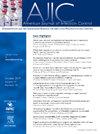Drastic hourly changes in hand hygiene workload and performance rates: A multicenter time series analysis
IF 2.4
3区 医学
Q2 INFECTIOUS DISEASES
引用次数: 0
Abstract
Background
High hand hygiene (HH) workload is a commonly cited barrier to optimal HH performance. The objective of this study was to assess trends of HH workload as defined by HH opportunities (HHO) and performance rates over different timescales using automated HH monitoring system data.
Methods
This multiyear retrospective observational study was conducted in 58 inpatient units located in 10 North American hospitals. HHO and HH rates were analyzed by time series mixed effects general additive model.
Results
Median HH rates peaked at 50.0 between 6 and 7 AM with a trough of 38.2 at 5 PM. HHO over hours in a day were the highest at 184 per hospital unit per hour at 10 AM with a trough of 49.0 between 2 and 3 AM. Median rates for day and night shifts were 40.8 and 45.5, respectively (P = .078). Weekend day shift had the lowest median rate (39.4) compared with any other 12-hour shift (P < .1018). The median rates and HHO varied little across days in a week and months.
Conclusions
HH workload and performance rates were negatively correlated and changed drastically over hours in a day. Hospitals should consider HH workload in the development and timely delivery of improvement interventions.
手卫生工作量和执行率每小时的急剧变化:多中心时间序列分析。
背景:手部卫生(HH)工作量大是影响最佳手部卫生表现的常见障碍。本研究的目的是利用手卫生自动监测系统的数据,评估不同时间范围内以手卫生机会(HHO)定义的手卫生工作量和绩效率的变化趋势:这项多年回顾性观察研究在北美 10 家医院的 58 个住院部进行。采用时间序列混合效应一般加法模型对 HHO 和 HH 率进行了分析:结果:HHO 率中位数在上午 6-7 点达到 50.0 的峰值,下午 5 点达到 38.2 的谷值。一天内各小时的 HHO 最高值为上午 10 点每医院单位每小时 184 例,最低值为凌晨 2-3 点之间的 49.0 例。白班和夜班的中位数分别为 40.8 和 45.5(P=0.078)。与任何其他 12 小时轮班相比,周末白班的中位数比率(39.4)最低(P=0.078):HH 的工作量和绩效率呈负相关,并且在一天中的不同时段变化很大。医院在制定和及时实施改进措施时应考虑到 HH 的工作量。
本文章由计算机程序翻译,如有差异,请以英文原文为准。
求助全文
约1分钟内获得全文
求助全文
来源期刊
CiteScore
7.40
自引率
4.10%
发文量
479
审稿时长
24 days
期刊介绍:
AJIC covers key topics and issues in infection control and epidemiology. Infection control professionals, including physicians, nurses, and epidemiologists, rely on AJIC for peer-reviewed articles covering clinical topics as well as original research. As the official publication of the Association for Professionals in Infection Control and Epidemiology (APIC)

 求助内容:
求助内容: 应助结果提醒方式:
应助结果提醒方式:


